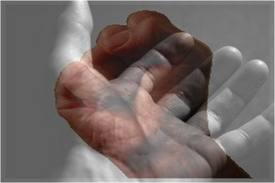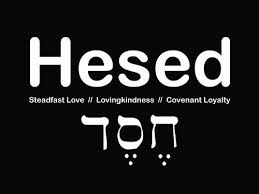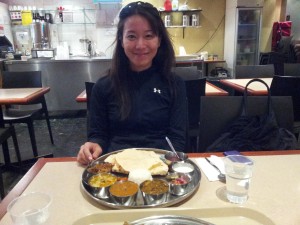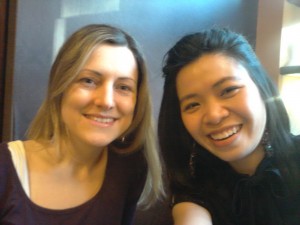
What we all long for!
Most of our problems in marriages, relationships, community, and church flow from a faulty view of the nature of God and the toxic residue we carry from our experiences of broken trust, promises and covenants not kept, and of betrayal in our relationships with one another. We get tired and resentful when we initiate with people, and they don’t initiate in return. We often feel like we have been used in relationships to benefit someone else’s agenda, or on the flip side we’ve been guilty of using people to meet our needs. We have a hard time trusting God or people because they have not kept their end of the bargain from our perspective.
I believe this is how many folks outside of the church feel when we develop a relationship with the subtle unspoken, or sometimes spoken agenda of converting them, or getting them into our church. People are smart and can smell a slick vacuum cleaner salesmen or multi-level marketing scheme a mile away. What would it look like to love people with no strings attached? Is that even possible or right?

He loves us even if we reject Him!
I believe that our best example of how authentic relationship works comes from God. The highest value in the Trinity is relationship flowing out of love. God loves us with no strings attached. He keeps His end of the bargain even when we don’t. He remains faithful even when we are unfaithful. (II Tim 2:13) He is a covenant and promise keeping God. (Hebrews 6:13-19) God takes the risk of loving us first while being fully aware that we may choose not to love Him in return. The Trinity will continue to love us even when we don’t reciprocate that love. He demonstrates unfailing kindness to us.
 The Hebrew word for this core part of the nature of God is Hesed. It is such a rich and profound word that describes the kind of relationship God practices. In Exodus 34: Psalm 86:15 from the Message says it this way: “But you, O God, are both tender and kind, not easily angered, immense in love, and you never, never quit. ” This thread of God’s faithfulness and everlasting kindness is woven through out the Bible. I believe it is the highest ethic in God’s heart, and what we so long for in our relationship with God, and one another. When we experience faithfulness we are secure in our relationships!
The Hebrew word for this core part of the nature of God is Hesed. It is such a rich and profound word that describes the kind of relationship God practices. In Exodus 34: Psalm 86:15 from the Message says it this way: “But you, O God, are both tender and kind, not easily angered, immense in love, and you never, never quit. ” This thread of God’s faithfulness and everlasting kindness is woven through out the Bible. I believe it is the highest ethic in God’s heart, and what we so long for in our relationship with God, and one another. When we experience faithfulness we are secure in our relationships!

Sealing the deal!
In the O. T., there are some interesting practices when one entered into a covenant with God or another person. An animal was sacrificed and cut in two halves from the nose to the tail. The two parties would stand on the blood facing each other. They would pledge their lives to each other, commit their wealth to each other, and they promised to take care of each others relatives if the either party died (Go’el – near kinsmen). They would pledge to be loyal to each other even if one party should screw up. They would then walk in a circle 8 around the halved animal, so that they ended up where the other party had stood to begin with. To seal the covenant, they would cut their wrists and grasp hands letting their blood mingle, and they add the other persons name to their name. In Genesis 17: 5 when God makes a covenant with Abram. Abram takes part of God’s name JHAWEH and inserts into his name becoming Abraham.
In our understanding of God, many of us wonder if He is a dual personality playing Jekyll and Hyde. In some instances in the Bible, He comes across as an angry God doling out severe punishments, wiping out people, and then on the other hand extending mercy. He seems to flip flop, depending on His mood that day. In relating to this kind of God we walk on egg shells never really knowing whether He will be kind towards us or angry at us. Out this notion of who God is we have a hard time trusting Him. This then impacts how we relate to one another.
I believe that to understand God’s holiness, judgments, power, and justice, we must see these characteristics through the prism of Hesed. If we don’t, holiness becomes legalism, a list of behaviors through which we judge people, or a form of religion where by through our behavior we try to win God’s approval. Through this skewed lens, justice and His judgments are viewed as punitive, or God venting His anger rather than demonstrations of His love.

Love puts boundaries around us to protect us!
When God stands up for and defends the under dog (the poor, the widow, the foreigner and the alien) we see His love expressed in justice. When through His judgments He brings order out of chaos caused by sin we taste of His unfailing kindness to restore His fabric of beauty, peace, and generosity to all of creation. When we experience the discipline of God, we see a Father who loves us enough to train us so we grow up. He cares enough to put up fences to keep us from harm, and yet gives us the freedom to face the consequences of crossing these boundaries. (Hebrews 12:5-11).
When it comes to God we are to respect Him, fear Him, and stand in awe of Him. Yet we can respect someone we don’t really like. If our view of God is that He is consistently angry, not pleased with us, constantly pointing out our faults and sins, and looking for reasons to punish us, we will want to hold Him at arms length. We end up avoiding or hiding from Him. If we see Him as a grouchy, mean-spirited, war mongering, vindictive God who keeps score, we will want to avoid spending time with Him, especially if we have not been faithful.

His Kindness never fails!
If our image of God is one where the consequence of choosing not to love Him is that He will rejects us, or will turn His back on us, we end up acting like servants trying to keep a Master happy, not friends. Yet Jesus in John 15 says that God wants us to be friends not merely servants. The question is “Do you like the God you worship?
Yet His nature is so opposite to what many of us believe. He is first and foremost a merciful and faithful God. When we blow it, He gives us a second, third, fourth, and who knows how many chances. It is His kindness that brings us to repentance. It is love that changes people.Do we really believe that? Exodus 34:6 in the Message says: “God, God, a God of mercy and grace, endlessly patient– so much love, so deeply true — loyal in love for a thousand generations, forgiving iniquity, rebellion, and sin..”
The practical question is: When we have tasted of and are secure in the unfailing kindness (Hesed) of God how will that impact how we live out relationships in community and mission? There is much that could be said, but for the sake of brevity, I will pose a few questions to ponder and ideas of how we can apply Hesed in our relationships in and outside of our communities of faith.
The end goal of communities of Jesus followers is summed up in John 15;13: Greater love has on one than this, that one lay down his life for his friends.” “We are to become a community of faithful forgiving friends!”

Communities of faithful friends!
Below are some questions to help us move towards that goal.
- When have you experienced betrayal or broken covenant in your life? What trust issues do have as a result?
- Is there still residual pain that causes you to hold God and people at arms length?
- Do you keep score and hold on to grudges from past hurts?
- When people don’t keep their end of bargain or meet up to your expectations do you feel resentful or look for pay back?
- Do you have some relationships in your life where there is no other agenda other than to simply enjoy their presence with no strings attached? The relationship is not founded on whether the personcan perform some function to further your agenda or mission as a community?
- How do you react to folks who blow it big time? Is their a safety in your community for folks to be vulnerable and honest with their mess? What happens when a person of another sexual orientation comes into your community?
- Does your community quickly make space and welcome in the foreigner, widow, single moms, orphans, and the poor?
- When a leader in the community has to step back from leading, do they still feel welcome and a part of the of the community? Is there an inner circle of the cool leader types and an outer circle of folks in your community? Is it hard to break into the ‘in’ circle?
- Is there the freedom to express our spoken and unspoken expectations for community, and the freedom for people to say ‘yes’ or ‘no’ to those expectations?
- Have you ever experienced people moving into the same neighborhood together to love one another and serve that community? Have you ever experienced people selling a second house or car and giving all that money to the poor out of love?
- Are you becoming a friend of Jesus and do you have a band of faithful, forgiving friends who practice ‘Hesed’?

Staying True!
When it comes to mission I believe we need to have genuine friendships with those outside the church and love people whether they ever say ‘yes’ to Jesus or not. We are to love folks whether they ever come to our church community or not.
Without authentic relationship where we love people with no strings attached, we end up assuaging our guilt, or getting weird by doing forms of power or prophetic evangelism where we parachute in and out of people’s lives doing our thing to people in a strange way. We end up doing programs of evangelism, like sharing the 4 spiritual laws, that feels forced or aggressive. We come across as arrogant, and as if we have the truth and others don’t. We do proclamation evangelism through a meeting without taking the time to really get involved with folks God has put around us to love and be loved by. All of these approaches to sharing our faith are good and effective, but lack integrity if we don’t start with real relationships.
We need to chill and begin by just loving people, and letting them love us in return. Out of relationship, God will give us opportunity to share our story of how we have had an encounter with Jesus where we have tasted of His unfailing kindness that has met the deepest longing in our hearts, and is the reason why we love others with no strings attached. As Jesus said in John 13:35 “As I have loved you, so you must love one another. All men will know that you are my disciples if you love one another.”
















